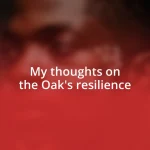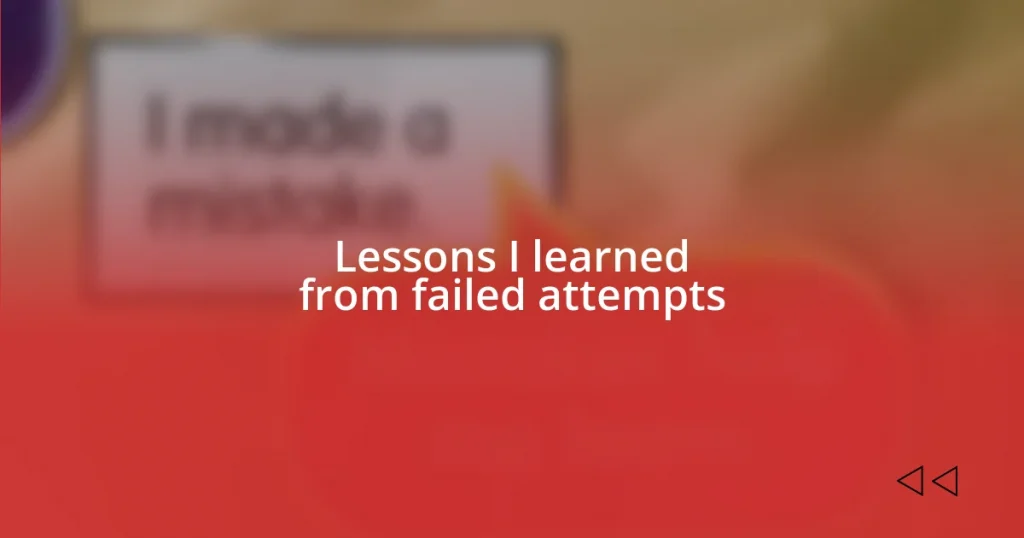Key takeaways:
- Failure serves as a powerful teacher, offering lessons in resilience and adaptability, leading to personal and professional growth.
- Common reasons for failure include a lack of clear goals, poor planning, and the fear of failure, which can hinder progress and innovation.
- Embracing a growth mindset transforms setbacks into opportunities for learning and improvement, enhancing skills and relationships.
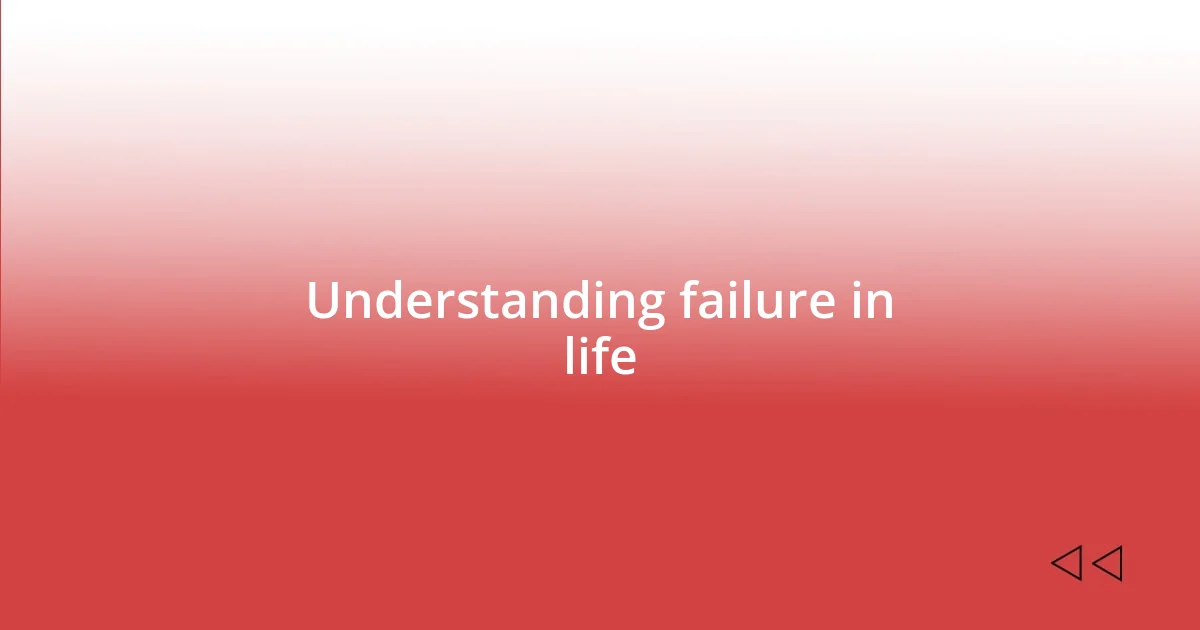
Understanding failure in life
Failure is often seen as a negative experience, but I’ve come to realize it can be a powerful teacher. I remember a project I poured my heart into, only to see it flop spectacularly. At first, that blow felt crushing, but looking back, I see how that failure forced me to reevaluate my approach and ultimately led to more successful ventures later.
Feeling the sting of failure can be daunting, can’t it? I once failed to meet a significant professional goal, and I found myself lost in the cycle of self-doubt. Yet, in that moment of despair, I learned the importance of resilience. It was a struggle, but I embraced the discomfort and learned to appreciate the journey, not just the destination.
It’s interesting to consider how often we shy away from discussing failure, as if it’s something to hide. The truth is, every stumble offers us insights into our strengths and weaknesses. When I share my stories of failure with friends, it opens up conversations that lead to deeper connections and shared experiences. Why do we keep such valuable lessons to ourselves? Embracing failure means embracing growth—and isn’t that what we all ultimately seek?
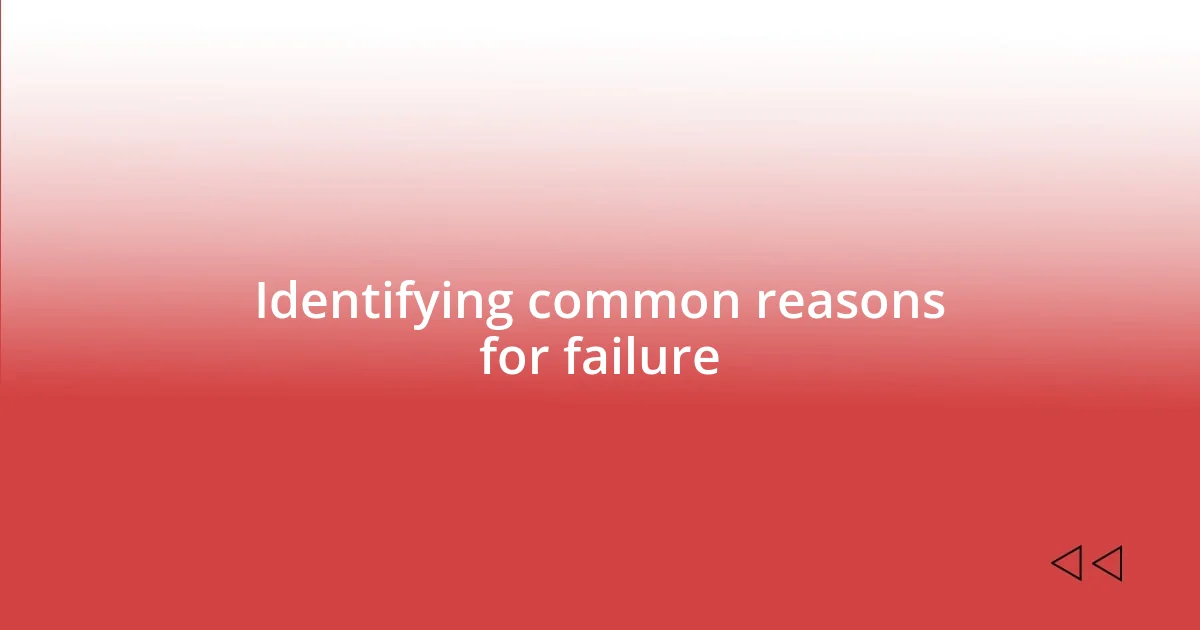
Identifying common reasons for failure
Identifying common reasons for failure is essential for personal and professional growth. In my journey, I’ve recognized that one common reason many people encounter is a lack of clear goals. I once embarked on a venture without a well-defined target, and it quickly became evident that I was adrift. My efforts felt like throwing spaghetti at a wall, hoping something would stick. What I learned was that clarity fuels motivation.
Another frequent pitfall is poor planning. I remember attempting to launch a community event with little more than a few ideas scribbled on a napkin. The chaos that ensued taught me that organization creates a solid foundation for success. The emotions that came with that experience—frustration and embarrassment—were pivotal in reinforcing the need for a strategic approach in any initiative I tackle.
Lastly, my experience has shown me that fear of failure can paralyze progress. Early in my career, I avoided taking risks due to anxiety about potential failure. However, I discovered that taking calculated risks often leads to some of the most rewarding outcomes. Through this realization, I embraced a mindset that views failure not as an endpoint but as a stepping stone.
| Common Reasons for Failure | Insights from Personal Experience |
|---|---|
| Lack of Clear Goals | Without clear objectives, my efforts felt unfocused and ineffective. |
| Poor Planning | Insufficient organization led to chaos and regret in one of my events. |
| Fear of Failure | Overcoming this fear allowed me to take greater risks and reap greater rewards. |
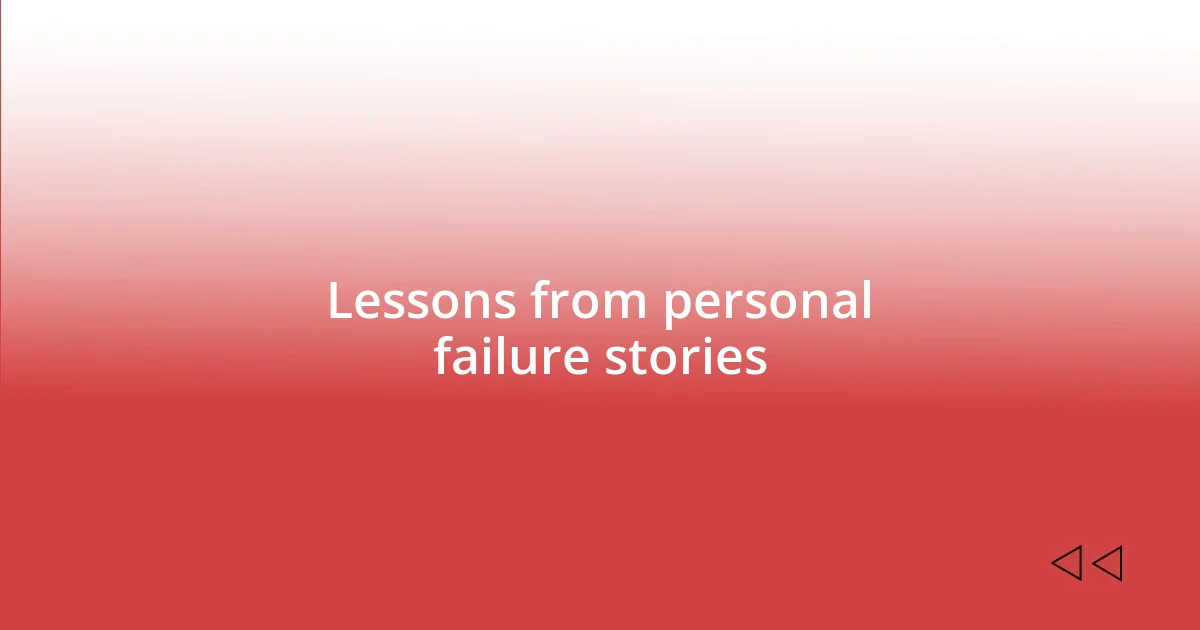
Lessons from personal failure stories
When I reflect on my past, I realize just how pivotal those missteps have been in shaping who I am today. One particular instance comes to mind—starting a business that never quite took off. I remember the excitement of my initial plans, but as weeks turned into frustrating months, I learned a painful but crucial lesson about the importance of adaptability. The experience taught me that flexibility in the face of failure can unlock new paths and opportunities I never considered before.
From failures, I’ve gleaned wisdom that extends beyond mere resilience; it’s about the courage to pivot. I recall a time when I struggled with launching a new product that I believed was perfect. The feedback was not what I expected, and I found it hard to swallow. Yet, that feedback was invaluable. It taught me to listen closely to my audience and understand their needs rather than forcing my vision.
Here are key insights from my personal failures:
- Embrace Adaptability: Realizing that plans can change helped me navigate rough waters effectively.
- Value Feedback: Constructive criticism is a treasure; it showed me how to improve and innovate.
- Cultivate Emotional Intelligence: Understanding my reactions during failure allowed me to respond constructively rather than retreating into frustration.
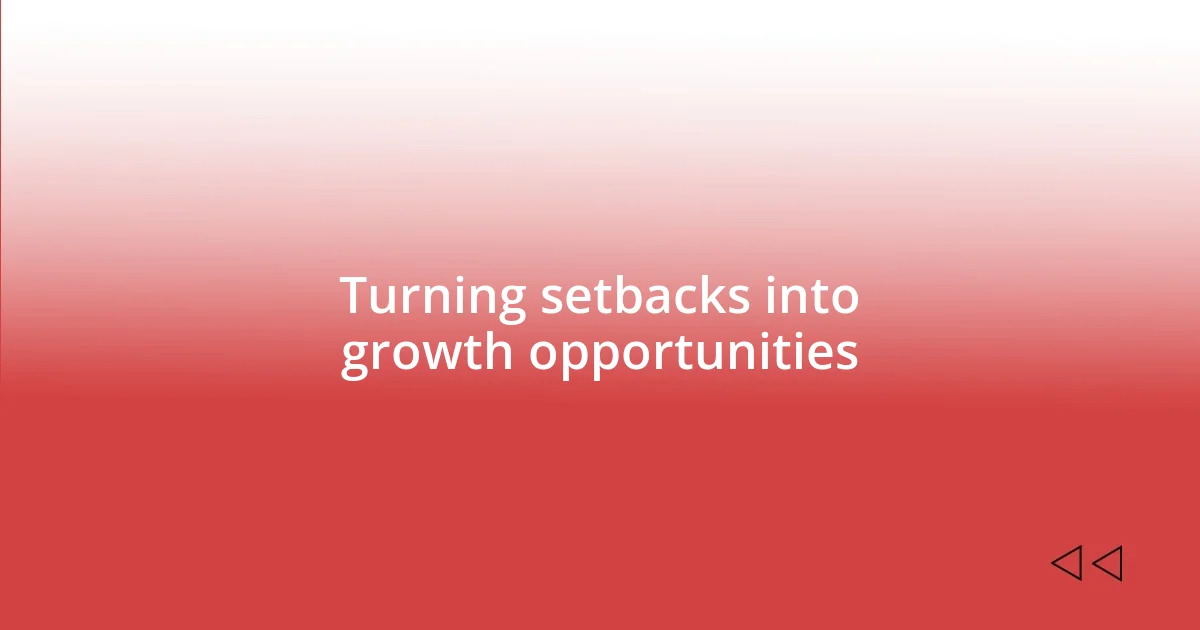
Turning setbacks into growth opportunities
When I think about setbacks, I can’t help but remember a particularly disheartening chapter in my career. I was leading a project that, despite my enthusiasm, crumbled before my eyes. It felt like I was holding a fragile house of cards—one gust of wind and everything fell apart. Yet, upon reflection, I realized that this failure provided me with an invaluable gift: the opportunity for deep introspection. It forced me to reevaluate my methods and priorities, allowing me to emerge with a clearer vision and stronger resolve. Have you ever experienced something similar—where a setback knocked you down but opened your eyes to something better?
I’ve discovered that failure often beckons us to adopt a growth mindset. For instance, I once missed a critical deadline for a project, which led to frustrations from my team and a loss of trust from my client. Initially, I wallowed in self-blame, but then I remember thinking, “What’s the lesson here?” This reflection transformed my outlook, prompting me to implement more robust time management practices. In this way, I turned an uncomfortable situation into a catalyst for change. Have you ever had that moment where you flipped the script on failure and used it as fuel for growth?
Additionally, I’ve learned that setbacks can strengthen your relationships with others. I vividly recall a time when a failed collaboration left me feeling isolated and disappointed. However, this experience nudged me to reach out, communicate my feelings, and seek support. Engaging with others helped me see the bigger picture and reminded me that we’re all in this together, navigating trials and triumphs alike. It taught me that vulnerability can bridge gaps and create deeper connections. Has a setback ever sparked a meaningful conversation for you, leading to unexpected support?
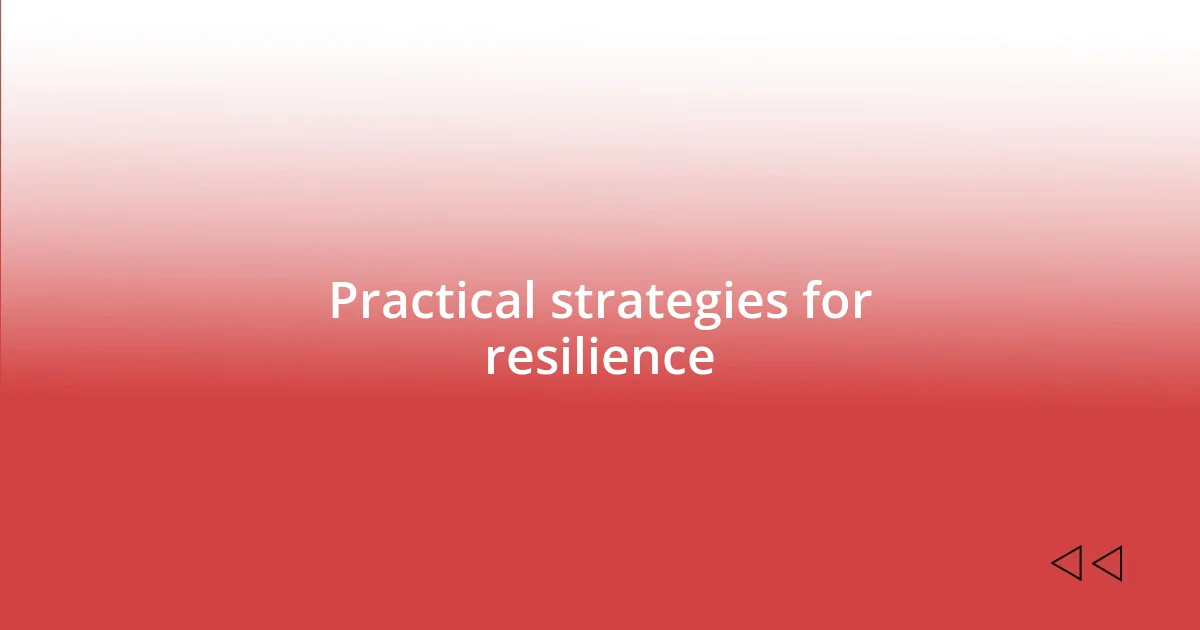
Practical strategies for resilience
When I think about resilience, one practical strategy I’ve found invaluable is the power of journaling. I started this habit after a particularly tough period when my motivation hit a low. Writing down my thoughts helped me untangle my emotions and gain clarity on what I truly wanted. It’s fascinating how simply putting pen to paper can reveal patterns and insights. Have you ever tried journaling? I’d bet you’d be surprised at how much it can guide you through challenges.
Another strategy that has shaped my resilience is surrounding myself with a supportive network. I vividly recall a time when everything felt overwhelming, and I reached out to friends who offered both guidance and a listening ear. Their encouragement didn’t just lift my spirits; it reminded me that I wasn’t alone in my struggles. So, how often do you lean on your support system? I urge you not to underestimate the positive energy that comes from connecting with others, especially during tough times.
Lastly, embracing a routine has also played a crucial role in my resilience. I realized that when chaos ensues, establishing small daily habits can provide a sense of normalcy and control. For instance, dedicating a few minutes every morning to meditate or exercise made me feel grounded even amidst turmoil. Have you found comfort in establishing a routine? It’s amazing how these small acts can help buffer against the unpredictability of life, nurturing both mental and emotional strength along the way.
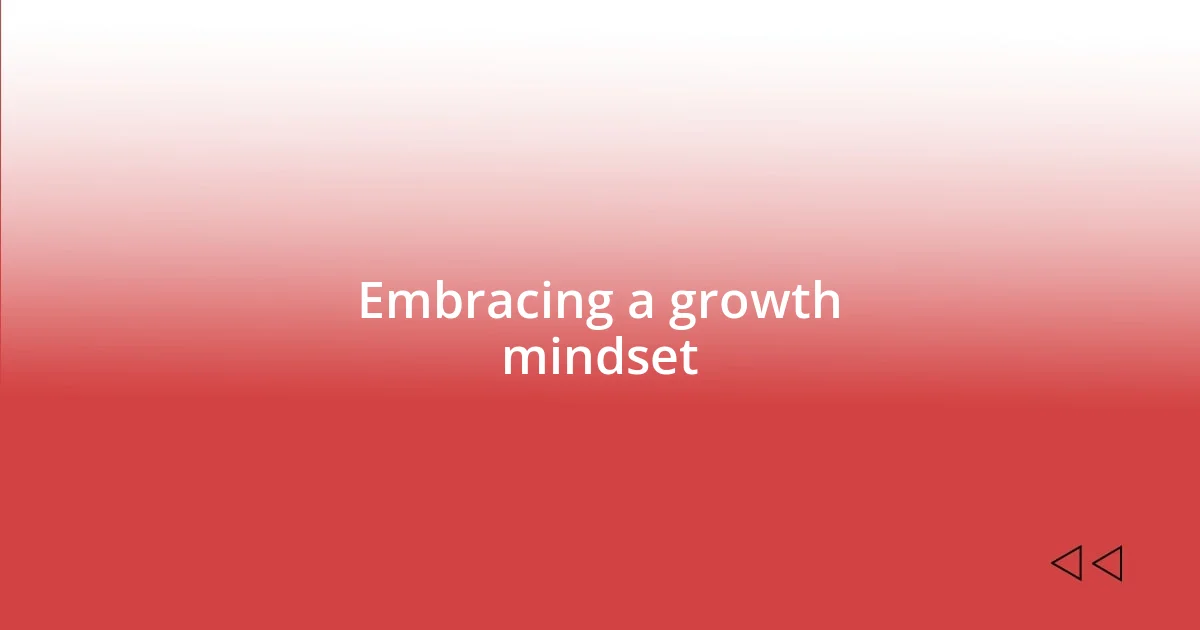
Embracing a growth mindset
Embracing a growth mindset isn’t just about recognizing failure; it’s about actually seeking growth from it. I remember once flunking a presentation I had poured my heart into. The audience felt detached, and to be honest, so did I afterward. Initially, I was devastated, but as I replayed that moment in my mind, I couldn’t help but see it as a treasure trove of lessons. I began exploring not just what went wrong, but how I could refine my public speaking skills. Have you ever felt that urge to improve after falling short, even in the midst of disappointment?
When I think of my growth mindset journey, it often revolves around my attitude towards challenges. There was a time when I hesitated to take on leadership roles, fearing I would fail and disappoint others. But as I forced myself to step outside my comfort zone and accept a leadership position, I discovered something incredible: failure was not the end; it was a stepping stone. Each misstep taught me more about myself and my abilities. I often ask myself, “What would I learn if I dared to try again?” This personal inquiry helps me view each challenge as an opportunity rather than a threat.
Turning my setbacks into stepping stones required a conscious shift in perspective. I distinctly recall a business deal falling through at the very last minute, leaving me feeling defeated. Yet, rather than sulk in the loss, I began to analyze the entire process. What did I miss? What could I do differently next time? Those questions eventually led me to study negotiation strategies and improve my skills. A simple failure became a launching pad for growth. Can you think of a setback that compelled you to rethink your approach? It’s enlightening to see how our downfalls can fuel our upward trajectories!






